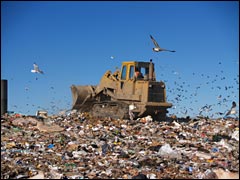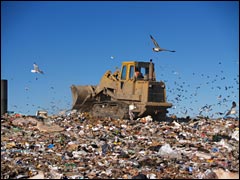
Waste can have a life beyond the landfill.
Consider the extraordinary efforts we undertake to secure a barrel of oil. Lives lost from wars. Oil-rig blowouts. Cancer clusters downwind of refineries. 100,000 premature deaths each year in America alone when we combust the stuff in our engines. Consider the 28 million tons of plastic waste we send to landfills each year, essentially re-burying the oil in the earth, but this time in places that make it virtually impossible to recover. Then we repeat the process over and over again.
What if we could mitigate at least some of this madness by putting those waste plastics to productive uses? What about the other 140 million tons of other types of waste that we send to landfills each year? Bottom line — is a zero-waste society plausible and profitable, or just a pipe dream?
In 1989, California passed a law that mandated diversion of 50 percent of solid waste away from landfills by 2000. Reducing wasteful packaging and other materials, reusing as much as possible, and aggressively recycling any useful commodities like glass and aluminum resulted in California achieving that goal on schedule. This success led to the passage last year of a new target — 75 percent diversion — and inspired a lot of people to start thinking about a zero-waste society.
Around the world, communities, governments, and companies are beginning to dip a toe in the waters of the zero-waste movement, and the surprising results are that new technologies, businesses, and jobs are being created.
For example, old carpet remains one of the biggest contributors to landfills. In California, The Carpet Recyclers are actually disassembling old carpet into its constituent commodities (including harvesting the components in the glue) and selling the resulting materials back to carpet makers. Other building and demolition wastes are also disproportionate contributors to landfills, but Urban Miners in Connecticut has found a way to disassemble that debris and return it to the construction industry for remodels and new buildings.
Of course, not all waste has quite so obvious a path from “cradle to cradle.” For example, Americans dump over 3 million tons of used disposable diapers into landfills each year, but may learn something about turning, uh, “waste” into wealth. U.K.-based Knowaste recycles soiled diapers and converts them to energy and recovered fibers and plastics.
Electronic waste is another category of opportunity. Everything from fluorescent light tubes to vacuum cleaners to computer monitors once clogged the nation’s landfills, but in many states today they are collected and broken down into plastics, glass, metals, and precious metals. Some states charge a small fee on the purchase of new electronics, which is used to jump-start recycling businesses. In California alone, hundreds of new businesses were started since the e-waste law took effect in 2005, as is amply demonstrated on a searchable database.
With a global population that now exceeds 7 billion and a rapidly growing middle class, especially in developing economies such as Brazil, China, and India, resources are becoming increasingly scarce, and we can no longer afford to waste anything. Many communities are also running out of practical places to bury waste, and neighbors fight expansion of existing landfills.
More than a decade ago, this was already becoming obvious in the Los Angeles area. Over objections of my colleagues in local environmental organizations, I defended the rights of Waste Management Inc. to expand its Sunshine Canyon Landfill, because the alternative was to truck garbage out to the desert some 75 miles away, a practice that turned my community’s waste into someone else’s problem, while generating more air pollution from thousands of additional truck trips each year.
A better solution is to make landfills a thing of the past by challenging our imaginations and ingenuity to devise more zero-waste strategies that convert garbage into gold.


